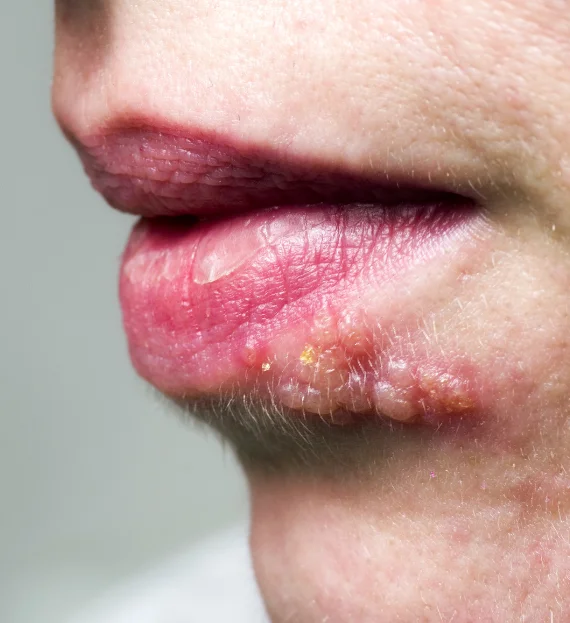Herpes
Herpes caused by virus – Herpes Simplex virus which are of 2 types, HSV-1 & HSV-2 infecting the wide age group – neonates to geriatric population
HSV-1 causes the oral herpes or cold sores whereas HSV-2 causes the genital herpes infections. Herpes symptoms depends upon the herpes type, location of the infection. The contagious nature of the virus makes it very problematic skin condition which not only needs medical attention but also demands correction in personal habits.
Herpes
Anti-viral medications like acyclovir, valacyclovir, and famciclovir reduce the viral load, severity, and frequency of rashes outbreaks. It also prevents virus transmission.
Pain-relievers like ibuprofen, acetaminophen, and paracetamol helps in managing the pain, fever, and discomfort associated with herpes outbreak.
Topical creams or lotions containing calamine, anti-allergy chemicals, and anti-viral drugs help in soothing the rashes and relieving the itchiness and discomfort associated with herpes outbreak.
Personal habits play a vital role in preventing the transmission of virus/infections. Inculcating hygienic habits like frequent hand washing, keeping the affected area clean and dry, and maintaining personal habits and sexual behaviour.
Faq
Frequently Asked Questions
A. Herpes simplex virus (HSV) causes herpes infection. HSV-related infection is considered to be highly contagious and spreads through direct contact with affected skin/blisters or sores, through saliva or genital secretion of an infected person.
A. Yes. Herpes infection has signs and symptoms. It starts with fever and flu-like symptoms, swollen lymph nodes, and the appearance of small fluid-filled blisters or sores in the affected area.
- No. Medications cannot cure herpes but help in the following manner –
- Reduces the formation of no. of vesicles or rash
- Reduces the viral load in the rashes
- Reduces the severity of rashes
- Reduces the frequency of rash outbreak
Prevents the transmission of virus to others
Herpes can be prevented by following simple steps–
- Practicing safe sex
- No sexual contact during the herpes outbreak
- Maintaining personal hygiene
- Avoiding sharing of personal belongings like towels, undergarments, shaving kits, comb
A. Usually, herpes is diagnosed with a physical examination of the affected skin area. The appearance or representation of the blisters/rashes is very unique. For confirmation, the healthcare provider may swab the rash and get the laboratory test conducted.
A. Yes. Herpes is capable of causing complications with the nervous system like meningitis or encephalitis and increases the possibility of contracting other sexually transmitted diseases. Medical attention should be sought when symptoms persist or worsen for long time.
A. Yes. Herpes spread even when there are no visible symptoms of the infection outbreaks.
A. Yes. Herpes due to HSV-1 and HSV-2 get transmitted through oral sex and are capable of causing oral or genital herpes.






